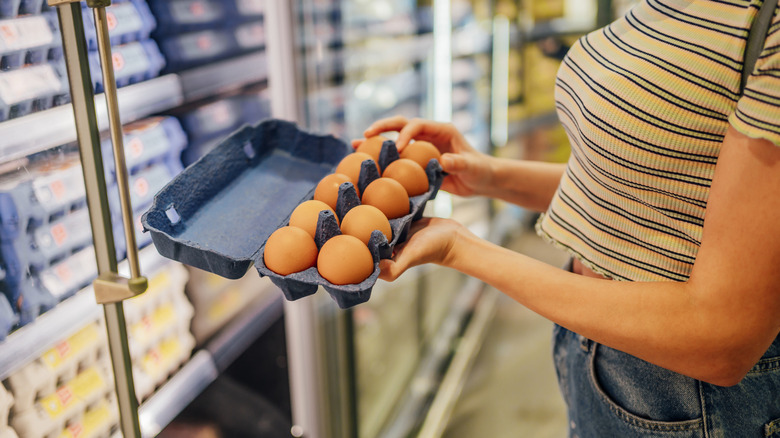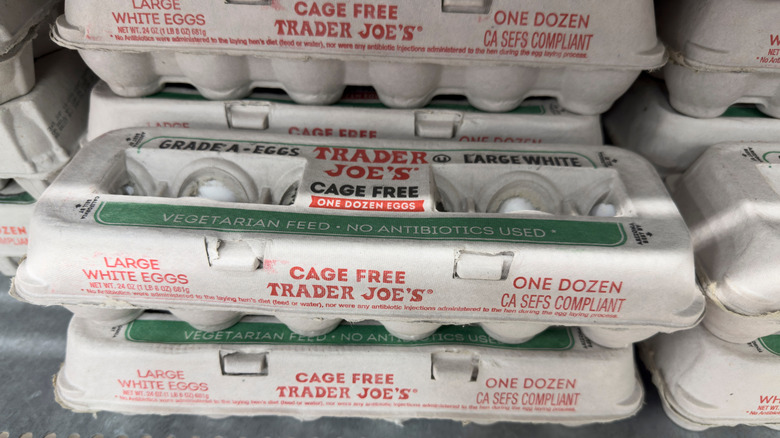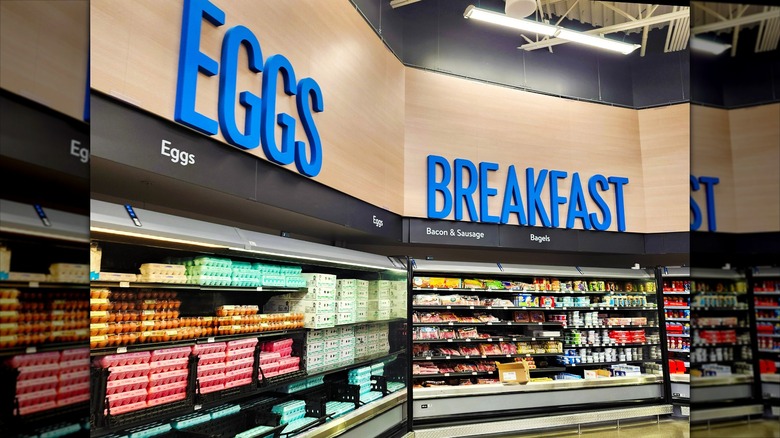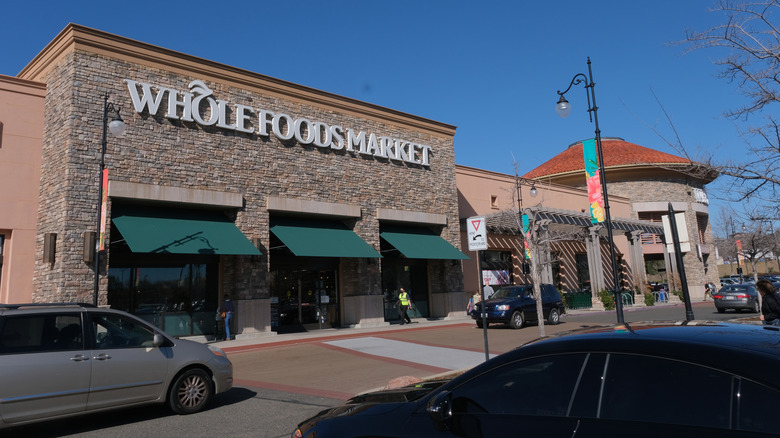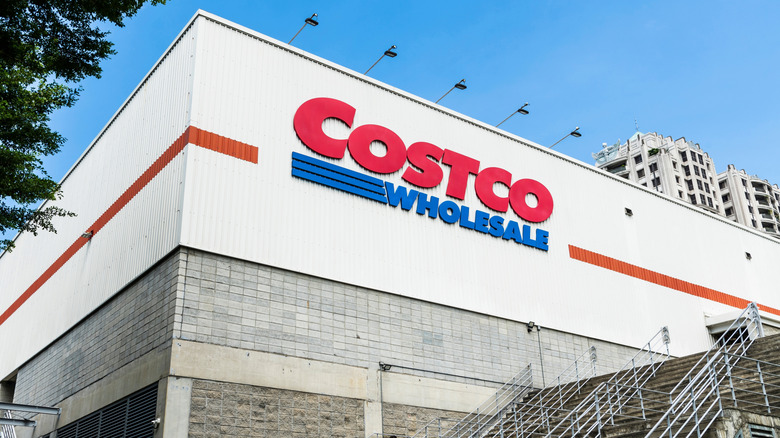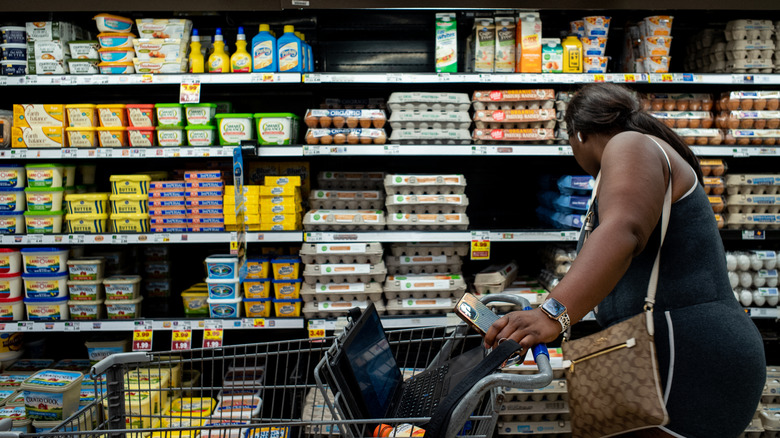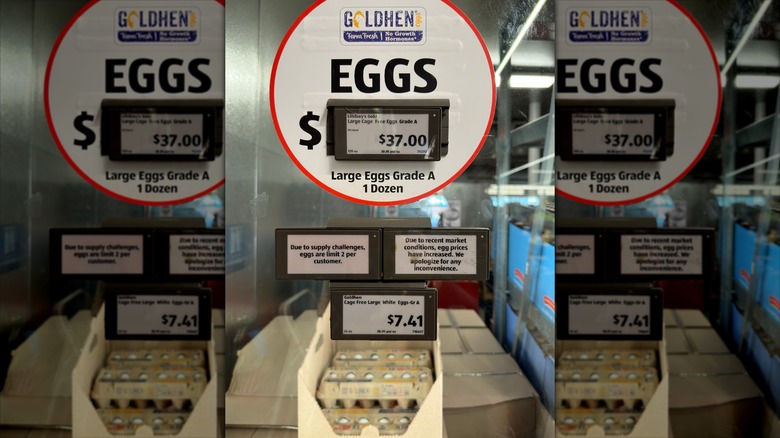6 Stores That Are Putting Limits On Egg Purchases
In a time of skyrocketing egg prices (a trend expected to last throughout 2025), consumers are facing yet another hurdle where this beloved breakfast staple is concerned. The avian flu outbreak, which led to the deaths or culling of over 40 million egg-producing birds in 2024 alone, has caused supply shortfalls. As a result, many major retailers are imposing restrictions on how many eggs a customer can buy during a single shopping trip. Trader Joe's, Walmart, Whole Foods, Costco, Kroger, and Aldi are among the chains implementing these policies. Some stores imposed a sweeping limit, while in other cases, the scope is smaller.
The situation has spurred frustration and panic buying, as illustrated by a Reddit post that claimed a person attempted to purchase 216 eggs during one shopping trip. Others have resorted to more drastic and dastardly measures, such as the theft of 100,000 eggs in Pennsylvania. These recent events reinforce the notion that truth is often stranger than fiction. While there's no telling how this crisis will evolve over the coming months, we're here to help shed some light on how stores are responding.
Trader Joe's
Trader Joe's is arguably taking a harder line with its restrictions than a number of other grocery chains. At all of its locations nationwide, each shopper is only allowed to buy one dozen eggs per purchase per day. In a statement provided to Axios, a company spokesperson said, "We hope these limits will help to ensure that as many of our customers who need eggs are able to purchase them."
Much like eggs these days, TJ's locations can be hard to come by. The grocery chain is known for employing a gradual approach to store expansion, which explains why you might not have a Trader Joe's in your neighborhood. For people with access to the store, these recent limitations could necessitate an update to their shopping list. Fortunately, there are lots of great egg substitutes out there, including aquafaba, silken tofu, and mashed banana. So at least your baked goods won't need to suffer, even if you experience an eggless morning meal.
Walmart
The prospect of a ceiling on egg purchases at Walmart might be disappointing since the chain is best known for low prices. However, shoppers might breathe easier with the realization that only a certain size of carton is affected. Customers buying a 60-count carton will be restricted to just two per purchase, but they can grab as many smaller cartons as they see fit. Like other chains, Walmart states that this measure is to ensure all shoppers can have access to eggs during the bird flu-related shortage. Keep in mind that it's not clear which stores are affected by the limitation, which means your shopping experience could vary depending on where you live.
As for what price to expect, that's also likely to vary based on your location. The Walmart website shows that a dozen large Great Value eggs cost $5.46 online for a store in Pittsburgh. While not exactly cheap, that is well under some of the costs shoppers are encountering in other parts of the country. The online price for 12 large Great Value eggs at an Anaheim, California, location is currently $7.42. And per the LA Times, some consumers at unnamed stores in the state have reported prices of $9 or higher for a single carton of eggs.
Whole Foods
There's no indication that all Whole Foods locations are implementing limits on the purchase of eggs, but Business Insider reports that at least some are sporting signage warning customers of restrictions. The stores that are impacted prohibit customers from buying more than three cartons at a time, and a sign posted within a Wisconsin location states that the store is "currently experiencing difficulty sourcing eggs that meet our strict animal welfare standards."
As featured on its website, Whole Foods has rigorous guidelines when it comes to egg-producing hens. For instance, hens must live in a cage-free environment and must be able access the outdoors in an area that's at least the same size as the hen house where the birds reside. Additionally, the chain requires all hens to be reared within a pasture where they can graze and forage. These high standards put Whole Foods in a challenging position during the avian flu outbreak, as creating the most amenable circumstances for egg-laying birds is bound to be a lot more difficult these days.
Costco
Costco is a store where bigger is almost always better. Despite this, the bulk retailer is putting the breaks on egg purchases and restricting its members to just three cartons per trip. As you might expect, the store's offerings are a bit more sizable than what you'd find at your standard grocery chain. Customers can buy containers of two dozen and four dozen eggs.
It doesn't appear that Costco's limits are a factor at all warehouses across the country, as reports of restrictions are only coming in from select locations. And despite steps to make certain that all customers retain equal access to eggs, some individuals are attempting to game the system. In a recent clip posted to Instagram, Costco customers were seen returning what appeared to be a giant stack of eggs. The caption alleged that the shoppers found a cheaper option elsewhere.
Kroger
Kroger locations are spread out over 16 states, with 1,242 total stores in total. The chain has not placed an across-the-board restriction on egg purchases, but certain divisions (which are categorized by metropolitan area) have. A spokesperson explained to NPR that at these locations, each customer can buy a maximum of two dozen eggs per visit. It's not clear which stores are impacted, or if the chain will expand the restriction to more places.
Getting a handle on the bird flu outbreak is likely to be a challenge for most manufacturers, as the unpredictable nature of the virus makes it hard to project what might happen next. Also, for farms that have experienced outbreaks, the process for bouncing back is complicated. For instance, extensive cleaning, sanitation, and testing is necessary after an outbreak to ensure that new birds don't contract the illness once they're brought into the farm. Based on these factors, the shortage and its subsequent effects will continue taking their toll on both businesses and consumers.
Aldi
Aldi has a reputation for providing quality groceries at reasonable prices and has even been ranked as one of the least expensive grocery chains in the U.S. (along with Trader Joe's and Market Basket). However, the discount retailer has also experienced strain related to the egg shortage. While it's not clear how many locations are impacted, some Aldi stores have restricted each shopper to two cartons per day.
The policy is bound to cause consternation among affected Aldi shoppers. On the bright side, some customers have said the chain's prices are a lot lower than at other stores. In late January, a Reddit user stated their local Aldi charged just $4.19 per carton, and other commenters claimed to have encountered similar prices where they lived. However, according to the store's online shopping portal, a dozen large eggs currently costs $6.05 at a Pittsburgh Aldi location. The uncertainty of bird flu means that egg prices and availability are bound to be quite tenuous for some time.
